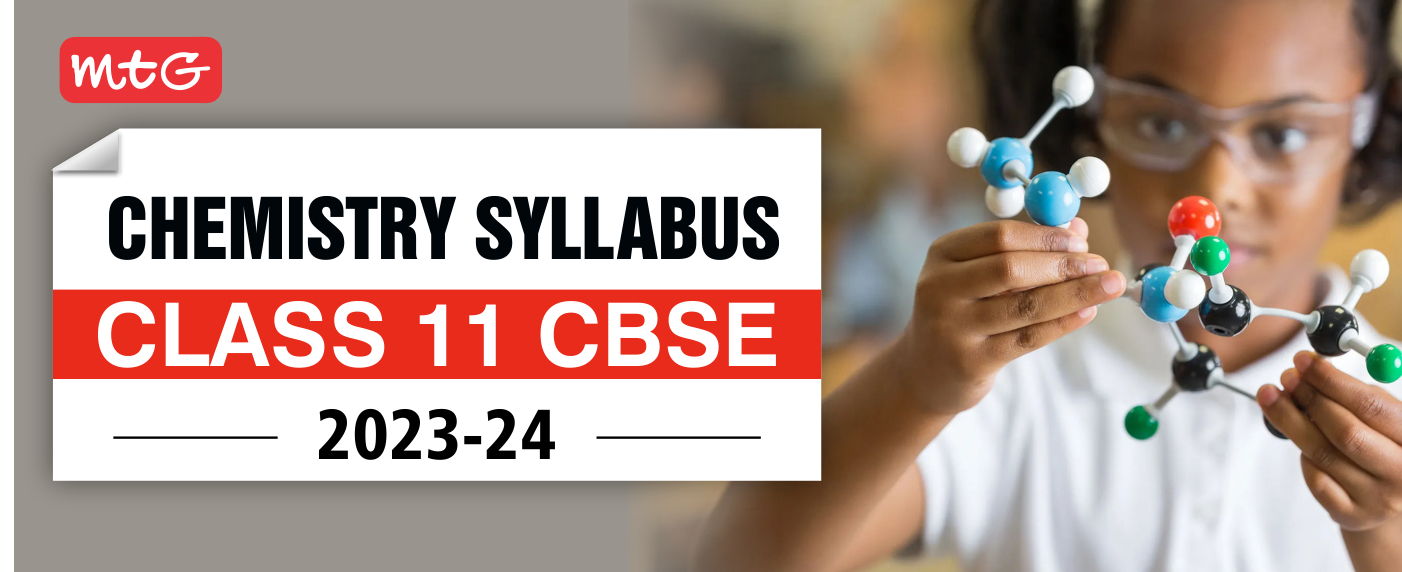
The Central Board of Secondary Education, CBSE, has issued the Class 12 Chemistry Syllabus 2024–25. Since the new academic year has begun, students should start preparing right away so that they won’t be overwhelmed at the last minute.
This article contains in-depth information about the class 12 CBSE Chemistry Syllabus that may be used to get ready for the CBSE Board Exam. Additionally, you can make use of the most updated CBSE Class 12 syllabus with CBSE BOOKS like Reference books for class 12, CBSE Books for class 12, CBSE previous year question papers class 12, to ace the biology board exam.
Important – Deleted Syllabus of Class 12 (2023-24) From NCERT Textbooks
Also Check – Deleted Syllabus of Class 12 Chemistry (2023-24)
Class 12 Chemistry Syllabus 2024-25 CBSE Board
Students can see the latest released CBSE Class 12 Chemistry Syllabus 2024-25 below.
| S.No | Title | Marks |
|---|---|---|
| 1 | Solutions | 7 |
| 2 | Electrochemistry | 9 |
| 3 | Chemical Kinetics | 7 |
| 4 | d -and f -Block Elements | 7 |
| 5 | Coordination Compounds | 7 |
| 6 | Haloalkanes and Haloarenes | 6 |
| 7 | Alcohols, Phenols and Ethers | 6 |
| 8 | Aldehydes, Ketones and Carboxylic Acids | 8 |
| 9 | Amines | 6 |
| 10 | Biomolecules | 7 |
| Total | 70 |
Unit-II: Solutions
Types of solutions, expression of concentration of solutions of solids in liquids, solubility of gases in liquids, solid solutions, Raoult’s law, colligative properties – relative lowering of vapour pressure, elevation of boiling point, depression of freezing point, osmotic pressure, determination of molecular masses using colligative properties, abnormal molecular mass, Van’t Hoff factor.
Unit-III: Electrochemistry
Redox reactions, EMF of a cell, standard electrode potential, Nernst equation and its application to chemical cells, Relation between Gibbs energy change and EMF of a cell, conductance in electrolytic solutions, specific and molar conductivity, variations of conductivity with concentration, Kohlrausch’s Law, electrolysis and law of electrolysis (elementary idea), dry cell-electrolytic cells and Galvanic cells, lead accumulator, fuel cells, corrosion.
Unit-IV: Chemical Kinetics
Rate of a reaction (Average and instantaneous), factors affecting rate of reaction: concentration, temperature, catalyst; order and molecularity of a reaction, rate law and specific rate constant, integrated rate equations and half-life (only for zero and first order reactions), concept of collision theory (elementary idea, no mathematical treatment), activation energy, Arrhenius equation.
Unit-VIII: d and f Block Elements
General introduction, electronic configuration, occurrence and characteristics of transition metals, general trends in properties of the first row transition metals – metallic character, ionization enthalpy, oxidation states, ionic radii, colour, catalytic property, magnetic properties, interstitial compounds, alloy formation, preparation and properties of K2Cr2O7 and KMnO4.
- Lanthanoids – Electronic configuration, oxidation states, chemical reactivity and lanthanoid contraction and its consequences.
- Actinoids – Electronic configuration, oxidation states and comparison with lanthanoids.
Unit-IX: Coordination Compounds
Coordination compounds – Introduction, ligands, coordination number, colour, magnetic properties and shapes, IUPAC nomenclature of mononuclear coordination compounds. Bonding, Werner’s theory, VBT, and CFT; structure and stereoisomerism, importance of coordination compounds (in qualitative analysis, extraction of metals and biological system).
Unit-X: Haloalkanes and Haloarenes.
- Haloalkanes: Nomenclature, nature of C–X bond, physical and chemical properties, optical rotation mechanism of substitution reactions.
- Haloarenes: Nature of C–X bond, substitution reactions (Directive influence of halogen in monosubstituted compounds only).
Uses and environmental effects of – dichloromethane, trichloromethane, tetrachloromethane, iodoform, freons, DDT.
Unit-XI: Alcohols, Phenols and Ethers
Alcohols: Nomenclature, methods of preparation, physical and chemical properties (of primary alcohols only), identification of primary, secondary and tertiary alcohols, mechanism of dehydration, uses with special reference to methanol and ethanol.
Phenols: Nomenclature, methods of preparation, physical and chemical properties, acidic nature of phenol, electrophillic substitution reactions, uses of phenols.
Ethers: Nomenclature, methods of preparation, physical and chemical properties, uses.
Unit-XII: Aldehydes, Ketones and Carboxylic Acids
- Aldehydes and Ketones: Nomenclature, nature of carbonyl group, methods of preparation, physical and chemical properties, mechanism of nucleophilic addition, reactivity of alpha hydrogen in aldehydes, uses.
- Carboxylic Acids: Nomenclature, acidic nature, methods of preparation, physical and chemical properties; uses.
Unit-XIII: Amines
- Amines: Nomenclature, classification, structure, methods of preparation, physical and chemical properties, uses, identification of primary, secondary and tertiary amines.
- Diazonium salts: Preparation, chemical reactions and importance in synthetic organic chemistry.
Unit-XIV: Biomolecules
- Carbohydrates – Classification (aldoses and ketoses), monosaccahrides (glucose and fructose), D-L configuration oligosaccharides (sucrose, lactose, maltose), polysaccharides (starch, cellulose, glycogen); Importance of carbohydrates.
- Proteins – Elementary idea of – amino acids, peptide bond, polypeptides, proteins, structure of proteins – primary, secondary, tertiary structure and quaternary structures (qualitative idea only), denaturation of proteins; enzymes. Hormones – Elementary idea excluding structure.
Vitamins: Classification and functions.
Nucleic Acids: DNA and RNA.
CBSE Class 12 Chemistry Practical Syllabus
| Evaluation Scheme for Examination | Marks |
|---|---|
| Volumetric Analysis | 08 |
| Salt Analysis | 08 |
| Content Based Experiment | 06 |
| Project Work and Viva | 04 |
| Class record and Viva | 04 |
| Total | 30 |
Hence, along with knowing the full Chemistry 12th Syllabus, you must also know your resources. Thus, refer to the syllabus and amazing reference books for class 12 and start galore in success. These books are set to make you CBSE champion and are available on MTG store, Amazon, Flipkart. Don’t be late to get your hands on the best books ever. All the best.
Newly Revised & Enriched Edition: CBSE Champion – Now CBSE Chapterwise Topicwise 10 Years solved papers





























